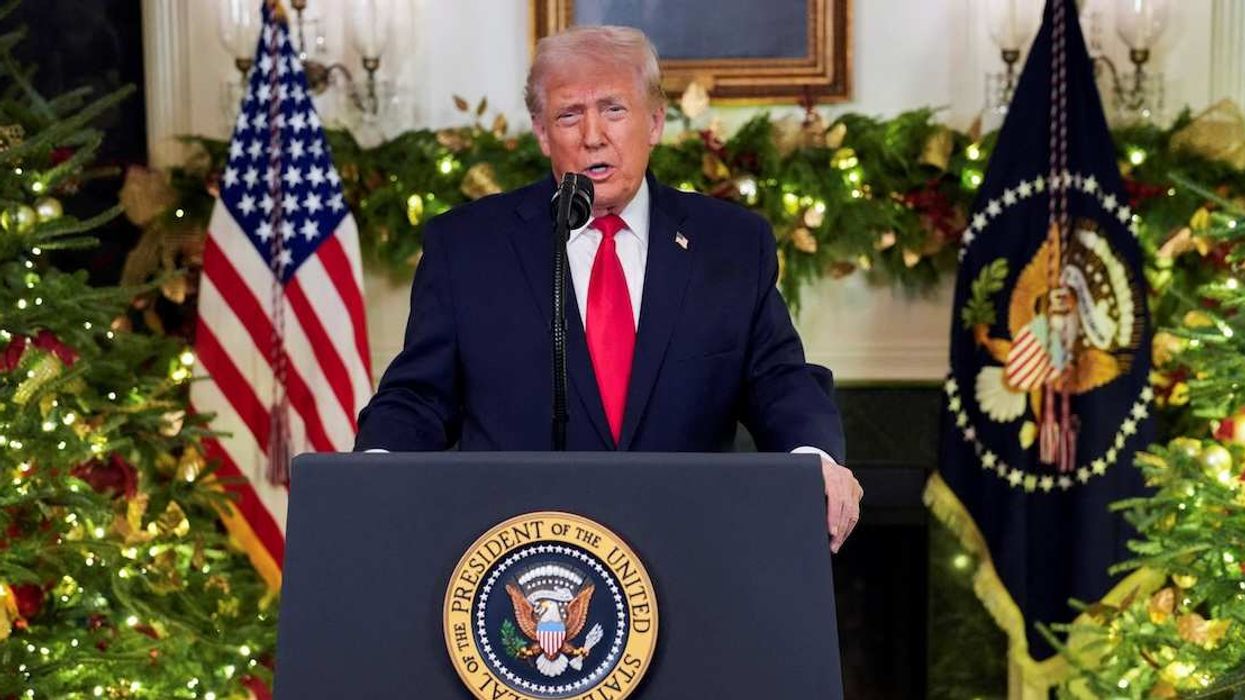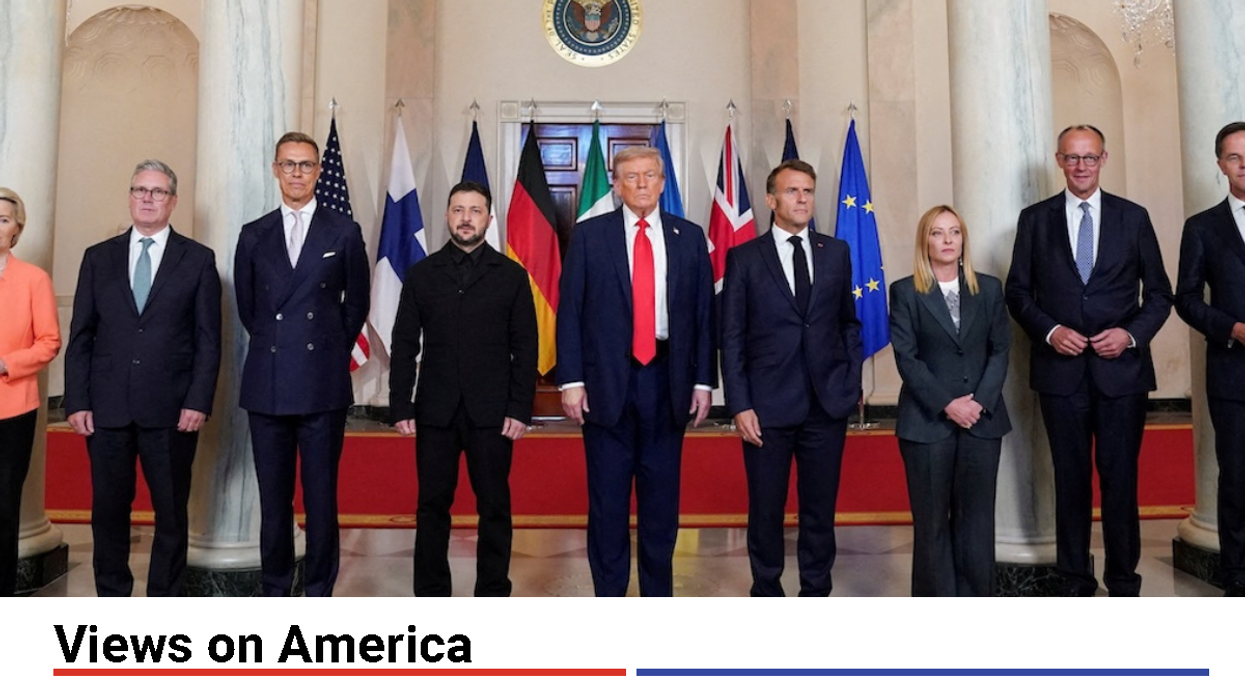Davos is a good place to recognize problems but not such a good place to solve them, according to Lord Mark Malloch Brown, a British politician and diplomat who was in the Swiss Alps this month. “A new generation of modest, listening and empathetic leaders is needed – the antithesis of Davos Man,” he tweeted.
The World Economic Forum has steered so far to the north of public opinion that it is now being used as a punchline – the New York Times noted that “the Davos Consensus” is now a counter-indicator of what is likely to happen. “Trump is already the president at Davos — which is a good thing because the Davos consensus is usually wrong,” said Alex Soros, son of George and chair of the Open Society Foundation, on a panel at this year’s forum.
Yet, there is a reason why 3,000 of the world’s most powerful people make the mid-winter trek to Switzerland every year and line up in the cold to pass through security outside the Grandhotel Belvédere: It’s valuable to understand what the global elite is thinking and to recognize the many problems the world is facing.
GZERO Media caught up with Mark Carney, former governor of the Bank of England and Bank of Canada, who now serves as chair of Brookfield Asset Management and Bloomberg Inc. (as well as acting as a UN special envoy on climate change), to hear what he picked up in Davos.
Economic optimism
On the global economy, the general feeling was of a resilient US economy contrasting with a stagnant Europe, particularly as Germany goes through a historical industrial restructuring moving away from a model built on cheap gas from Russia and exports to China.
The general outlook for China was bearish, with the downside of its ongoing real estate adjustment outweighing the boost from China’s growing competitiveness in electric vehicles and clean energy and its efforts to rebuild exports at a time when supply chains are being “de-risked.”
Premier Li Qiang told Davos that China’s economy is open for business, but Reuters reported that investors who attended a closed-door lunch with him remained skeptical about China’s charm offensive.
This points to more stimulus, Carney said. Indeed, Bloomberg reported last week that the Chinese government is considering a rescue package for slumping stock markets (the CSI 300 was down 11.4% last year, its third year of negative growth, while Hong Kong’s Hang Sen was down 14% in 2023).
On monetary policy, Carney said the expectation among many attendees was that interest rates have peaked but that there was only limited appreciation that the pace of reductions may be slower than the market has been pricing. During Davos, market expectations were that the Fed would begin cutting in March and then cut again another four or five times this year. But Carney believes the Fed will probably wait until June to begin cutting, followed by another one or two cuts this year. “However, if that’s because the US economy is stronger than expected, it would be net positive,” he said.
Global crises
Geopolitics weighed heavily in the Swiss Alps. While US-China relations appear to have stabilized in the short term, the Middle East conflict was widening alarmingly. Reuters reported that there were no practical advances on a Palestinian state, or even a cease-fire, at Davos.
The head of the Palestinian Investment Fund estimated that $15 billion would be needed just to rebuild houses in Gaza. Arab states said they would not fund reconstruction until there was a lasting peace, by which they meant a Palestinian state.
Yemeni and Iranian officials told Davos audiences the attacks in the Red Sea would not stop until Israel ended the war in Gaza. The CEO of oil giant Saudi Aramco warned that the world might see a shortage of oil tankers if the attacks continue, forcing shippers to choose longer alternative routes.
Bankers warned that increased shipping costs and the possibility of an oil price rise could prove inflationary. And attendees took note of the comments of Saudi Arabia’s Prince Turki al Faisal that “the present leadership of Hamas, the PLO, and of Israel should be excluded from any participation in any future political role.”
Good AI vs. Bad AI
AI was everywhere, with businesses focused on how to implement it, first in basic administration and more profoundly in re-engineering the production, sales, and marketing. The core question of whether workers will benefit — and when — was more hotly debated. Some, including the IMF, saw widespread disruption to jobs (up to 40% according to the Fund). The techno-optimists pointed to the ability of AI to re-skill workers rapidly and past experiences with major technological changes that belied the ‘lump of labor fallacy.”
Carney felt that AI would begin to have major impacts on productivity and growth by the end of the decade and that, history teaches, it would take a comprehensive response of business, government, and academia to ensure that workers share in the benefits.
Climate change
Coming less than two months after what was regarded as a business-heavy, successful COP28 in Dubai and with AI dominating much of the discussion, the climate change debate was relatively muted. But Carney said it would be a mistake to consider that the transition has been relegated down the agenda.
He said that it is now so core to the fundamental business model of most companies that it has become embedded as a driver of competitiveness.
Carney noted that five years ago, $500 billion was invested in the transition; last year, that number was $1.8 trillion, nearly double what was invested in oil and gas. The challenge is that this number needs to more than double again to about $4 trillion by the end of the decade.
He said that the transitions toward clean energy and AI actually work in tandem since, while AI is relatively capital-light, it requires a lot of data and computing power, which in turn requires clean energy. And AI solutions will help with optimizing grids, heating and cooling systems, and even supply chains.
It was noticeable that the backlash against Environmental, Social, and Corporate Governance, or ESG, meant it was rarely mentioned in Davos. Attendees like Canadian Deputy Prime Minister Chrystia Freeland were more focused on the new buzzwords – “supply chain resilience” – trying to convince investors that Canada has the critical minerals and clean energy they need, as businesses try to diversify sources away from China.
Sustainability is now about “resiliency building” that contributes to profitability, not just altruism.
Milei’s message
Javier Milei, the new Argentinian president, burst onto the main stage at Davos like an arsonist with a blowtorch, lambasting the proponents of state intervention and concluding with the rallying cry: “Long live freedom, damn it.” He said the Western world is facing a significant threat because its leaders have been co-opted by a worldview that leads to socialism and economic deprivation.
“We are here to tell you that collectivist experiments are never solutions to the problems that affect citizens. Trust me, no one is better than Argentina to provide testimony on this,” Milei said.
At the time of Milei’s inauguration, annual inflation stood at 143%, the currency had plunged, and four out of 10 Argentines were living in poverty. He has promised radical reforms, including deregulation and devaluation of the currency, and there was no evidence that he was prepared to dilute his agenda in his speech.
He was scathing about “neo-Marxists” who have “co-opted the common sense of the Western world” when it comes to the climate change agenda and said he considered all talk of “market failure” to be an oxymoron.
Carney has considerable experience in navigating market failures, having been in the Cash Room meeting in the US Treasury as Bank of Canada governor during the financial crisis, alongside other G7 finance ministers and central bankers, when the decision was reached to backstop the banking system with liquidity to prevent a repeat of the Great Depression.
“All ideologies are prone to extremism, and capitalism loses its sense of moderation when the belief in the power of the market enters the realm of faith,” he wrote in his book, “Values.” “There are no libertarians in a financial crisis.”
But he said he found Milei’s speech to be entertainingly provocative. “It was good theatre and raised some important issues,” he said, particularly his praise for entrepreneurs and his assertion that state control does not depend solely on owning the means of production but can include regulation. Carney noted, however, that Milei appeared oblivious that he was speaking to some of the world’s most successful entrepreneurs (such as Bill Gates), few of whose actions echo the “Atlas Shrugged” school of poverty elimination.
Carney concluded that, “where you stand depends on where you sit,” and that Milei’s vehemence was undoubtedly influenced by a long history of high levels of state intervention and indebtedness in Argentina.
After his speech, Milei sat down with International Monetary Fund Managing Director Kristalina Georgieva to discuss Argentina’s debt problems. He remained defiant: “Free enterprise capitalism is the only tool we have to end hunger and poverty,” he said.
Milei will have to face down entrenched opposition from those who rely upon rents from the state apparatus if he is to rid his country of the unwanted tag of the “Argentina paradox,” the world’s most glaring example of a developed economy that went backward.



















